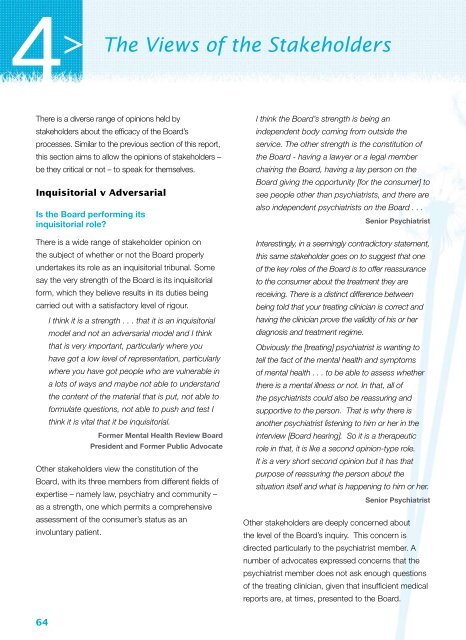Lacking Insight - Community Law
Lacking Insight - Community Law
Lacking Insight - Community Law
- No tags were found...
You also want an ePaper? Increase the reach of your titles
YUMPU automatically turns print PDFs into web optimized ePapers that Google loves.
4 > The Views of the StakeholdersThere is a diverse range of opinions held bystakeholders about the efficacy of the Board’sprocesses. Similar to the previous section of this report,this section aims to allow the opinions of stakeholders –be they critical or not – to speak for themselves.Inquisitorial v AdversarialIs the Board performing itsinquisitorial role?There is a wide range of stakeholder opinion onthe subject of whether or not the Board properlyundertakes its role as an inquisitorial tribunal. Somesay the very strength of the Board is its inquisitorialform, which they believe results in its duties beingcarried out with a satisfactory level of rigour.I think it is a strength . . . that it is an inquisitorialmodel and not an adversarial model and I thinkthat is very important, particularly where youhave got a low level of representation, particularlywhere you have got people who are vulnerable ina lots of ways and maybe not able to understandthe content of the material that is put, not able toformulate questions, not able to push and test Ithink it is vital that it be inquisitorial.Former Mental Health Review BoardPresident and Former Public AdvocateOther stakeholders view the constitution of theBoard, with its three members from different fields ofexpertise – namely law, psychiatry and community –as a strength, one which permits a comprehensiveassessment of the consumer’s status as aninvoluntary patient.I think the Board’s strength is being anindependent body coming from outside theservice. The other strength is the constitution ofthe Board - having a lawyer or a legal memberchairing the Board, having a lay person on theBoard giving the opportunity [for the consumer] tosee people other than psychiatrists, and there arealso independent psychiatrists on the Board . . .Senior PsychiatristInterestingly, in a seemingly contradictory statement,this same stakeholder goes on to suggest that oneof the key roles of the Board is to offer reassuranceto the consumer about the treatment they arereceiving. There is a distinct difference betweenbeing told that your treating clinician is correct andhaving the clinician prove the validity of his or herdiagnosis and treatment regime.Obviously the [treating] psychiatrist is wanting totell the fact of the mental health and symptomsof mental health . . . to be able to assess whetherthere is a mental illness or not. In that, all ofthe psychiatrists could also be reassuring andsupportive to the person. That is why there isanother psychiatrist listening to him or her in theinterview [Board hearing]. So it is a therapeuticrole in that, it is like a second opinion-type role.It is a very short second opinion but it has thatpurpose of reassuring the person about thesituation itself and what is happening to him or her.Senior PsychiatristOther stakeholders are deeply concerned aboutthe level of the Board’s inquiry. This concern isdirected particularly to the psychiatrist member. Anumber of advocates expressed concerns that thepsychiatrist member does not ask enough questionsof the treating clinician, given that insufficient medicalreports are, at times, presented to the Board.64
















